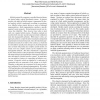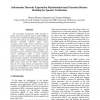148 search results - page 13 / 30 » Improving simulation-based verification by means of formal m... |
SIGSOFT
2007
ACM
14 years 8 months ago
2007
ACM
Automated verification is a technique for establishing if certain properties, usually expressed in temporal logic, hold for a system model. The model can be defined using a high-l...
TOPLAS
2008
13 years 7 months ago
2008
act Interpretation C. BERNARDESCHI, N. DE FRANCESCO, G. LETTIERI, L. MARTINI, and P. MASCI Universit`a di Pisa Bytecode verification is a key point in the security chain of the Jav...
ICFP
2005
ACM
14 years 7 months ago
2005
ACM
Proof-carrying code (PCC) is a general framework that can, in principle, verify safety properties of arbitrary machine-language programs. Existing PCC systems and typed assembly l...
SRDS
1999
IEEE
13 years 11 months ago
1999
IEEE
Hybrid systems like computer-controlled chemical plants are typical safety critical distributed systems. In present practice, the safety of hybrid systems is guaranteed by hazard ...
ICPR
2010
IEEE
13 years 5 months ago
2010
IEEE
The expectation maximization (EM) algorithm is widely used in the Gaussian mixture model (GMM) as the state-of-art statistical modeling technique. Like the classical EM method, th...


